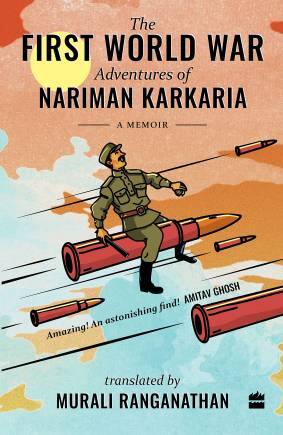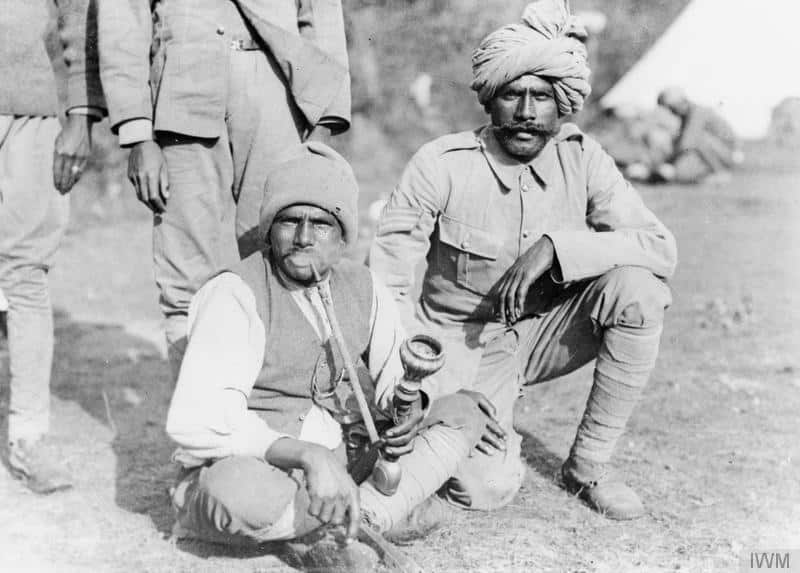



In his Sepoys in the Trenches, Gordon Corrigan paints a picture of the first contingent of Indian soldiers arriving in France in the autumn of 1914. This was just a fraction of the more than a million who fought for Britain during the First World War.
Some of them, he writes, were burly and bearded; others were tall and  aquiline; yet others were short, with wide-brimmed hats. Eventually, “the whisper went up and down the line that these were ‘Les Hindoues’ from the British Empire in the east”.
aquiline; yet others were short, with wide-brimmed hats. Eventually, “the whisper went up and down the line that these were ‘Les Hindoues’ from the British Empire in the east”.
The young Nariman Karkaria from Navsari was unlike all of them. He had been travelling on his own before the outbreak of the war and journeyed to London to join the British Army, in keeping with the Parsi Anglophilia of the time.
Notably, he was to become one of the few deployed on three different fronts of the Great War. He was in the trenches during the Battle of the Somme, participated in the capture of Jerusalem, and played a role in the Balkans.
After returning to India, he wrote a weekly column about his experiences in the Gujarati newspaper Jam-e Jamshed. These pieces were later collected in a book called Rangbhoomi Par Rakhad, published in 1922. It’s the only First World War account by an Indian that has so far been discovered.
One hundred years later, his exploits are available in an English translation titled The First World War Adventures of Nariman Karkaria. Scholar Murali Ranganathan, who unearthed the Gujarati volume and rendered it into English, writes that it is “one part autobiography, one part travelogue, and three parts war memoir”. All parts reveal a traveller who was a restless, blithe spirit.
In his introduction, Ranganathan notes that Karkaria’s breezy narrative style was inspired by the popular Gujarati travelogues of the time. Mishaps, hunger, and other travails are dealt with in the same grin-and-bear-it tone, which goes a long way in making the book so readable.
The intrepid Karkaria’s journeys begin in 1910 when, at the age of 16, he slips out of his Navsari home with a small bundle of clothes, a blanket and Rs 50 in his pocket. He makes his way to Mumbai, from where he takes a steamer to Hong Kong. After some months of working as a shop assistant, he sets off again, this time to Beijing.
When war is declared, he travels to London to enlist, taking the overland train journey via Siberia, Russia and the Scandinavian countries. After all, a straight line may be the shortest distance between two points, but it’s not necessarily the most picturesque.
In his missives from this period, Karkaria speaks of his unfamiliarity with new surroundings and provides tips for those who may want to walk in his footsteps. Tianjin is worth wandering around because of the European-style houses. One should not miss the Nihon Bridge at Dalny, adorned with ancient carvings. Siberian sledges are low-slung, “like those little wooden carts on which children drag each other around in Navsari”. His recollections are peppered with such observations.
Expenses are another ongoing concern. On his transcontinental train journey, for example, he discovers that a cup of coffee in the dining car “will set you back by three-quarters of a rupee”. This leads to the glum observation that “they do not seem to be troubled by any sense of guilt at these outrageous prices”.
There is casual racism in some descriptions of the Chinese and Japanese people he comes across, and in attitudes to alien eating and drinking habits. Ranganathan does point out that this was in keeping with prevalent ways of thought, but one wishes there was more evidence of travel broadening the mind.
Nevertheless, one has to admire Karkaria’s chutzpah, as well as the gumption that emerges during his war experiences. The arduous training, dreadful hours in and out of the trenches, and the deaths of fellow-soldiers are nonchalantly dealt with, though it’s clear that his experiences must have been hellish.
His own leg injury gets the same insouciant narrative treatment. After a brief recuperation in England, it’s back to battle with a rousing account of the endeavours to capture Jerusalem. Naturally, he doesn’t lose the chance to visit and describe its ancient sites.
Karkaria is in Thessaloniki tending to injured army personnel when the Allied victory is announced. Loud cheers erupt, a makeshift band begins to play and soldiers start to dance around a huge bonfire, which reminds him “of the night of Holi”.
 Indian soldiers in Britain during WWI. (Photo: Imperial War Museum via Wikimedia Commons)
Indian soldiers in Britain during WWI. (Photo: Imperial War Museum via Wikimedia Commons)
The end of the war doesn’t spell the end of his travels. On his way back he stops at Tbilisi, Baku and Istanbul, finally returning to the homeland: “To enter the Mumbai harbour once again and catch a glimpse of the famous Taj Mahal Hotel is enough to drive anyone crazy with happiness”.
Endearing though it may be, there’s no denying that Karkaria’s account is more than a little solipsistic. It is largely apolitical and untouched by nationalistic sentiment. Hardly anyone else is named or singled out, be they confidants or fellow soldiers. Occasionally, he mentions a companion with whom he takes a first look at “the fabled city of London”, or the expectation of meeting a friend during his Siberian sojourn, but no further details are vouchsafed.
For all that, The First World War Adventures of Nariman Karkaria is a series of jaunty reports from a born raconteur. As Amitav Ghosh says in his foreword, one can almost hear him reminiscing aloud to enthralled listeners at the Ripon Club in Mumbai or the Meherjirana Library in Navsari.
Discover the latest Business News, Sensex, and Nifty updates. Obtain Personal Finance insights, tax queries, and expert opinions on Moneycontrol or download the Moneycontrol App to stay updated!
Find the best of Al News in one place, specially curated for you every weekend.
Stay on top of the latest tech trends and biggest startup news.